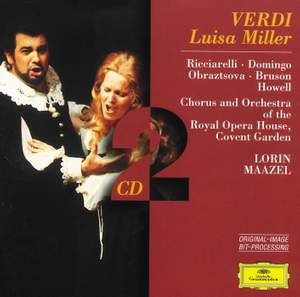Verdi: Luisa Miller
Gwynne Howell, Plácido Domingo, Elena Obraztsova, Wladimiro Ganzarolli, Renato Bruson, Katia Ricciarelli, Audrey Michael, Luigi de Corato
Chorus & Orchestra of the Royal Opera House, Lorin Maazel
The strength of this DG reissue is the singing of the three principals. The production of LuisaMiller at the Royal Opera House, Covent Garden, on which the set was based, probably marked the... — More…
Downloads
What are FLAC and MP3?Contents
Verdi: Luisa Miller
Work length2:12:56
$35.70
$48.30
- John Barker, Luigi De Corato (baritone), Wladimiro Ganzarolli (baritone), Gwynne Howell (bass), Audrey Michael (mezzo-soprano), Katia Ricciarelli (soprano), Renato Bruson (baritone), Plácido Domingo (tenor), Elena Obraztsova (mezzo-soprano)
- Royal Opera House Covent Garden, Chorus of the Royal Opera House, Covent Garden
- Lorin Maazel
- Recorded: 1979-06
- Recording Venue: unknown, London
Overture
Track length5:32
$0.85
$1.15
Introduzione
Track length1:08
$0.85
$1.15
Ti desta, Luisa, regina de'corti
Track length2:25
$0.85
$1.15





